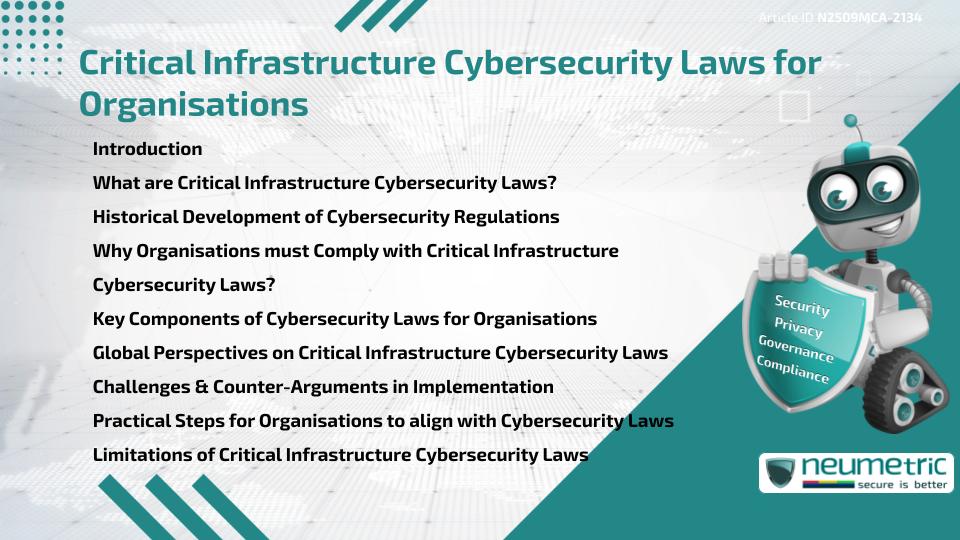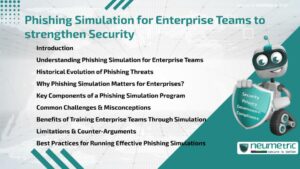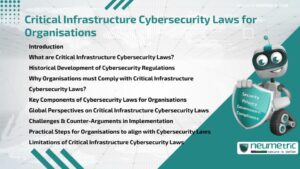Table of Contents
ToggleIntroduction
Critical infrastructure Cybersecurity Laws are designed to protect essential services such as Energy, Healthcare, Finance & Transportation from Cyber Threats. These Laws require Organisations to implement Security Measures, report incidents & safeguard Sensitive Data. They have become vital because Cyberattacks on Critical Infrastructure can disrupt Economies, compromise National Security & endanger Public safety. Organisations that fail to comply Risk facing Legal Penalties, Reputational damage & loss of Trust. This article explains the history, purpose, global scope, practical challenges & actionable steps related to Critical Infrastructure Cybersecurity Laws.
What are Critical Infrastructure Cybersecurity Laws?
Critical infrastructure Cybersecurity Laws are Legal Frameworks that set standards for securing Systems & Networks that support vital Services. For example, a Power grid or a Hospital relies on interconnected Digital Systems. If those Systems are attacked, the impact is far greater than just Data Loss. These Laws aim to reduce Risks, mandate reporting of Breaches & encourage collaboration between Governments & Private entities.
Historical Development of Cybersecurity Regulations
Cybersecurity regulations emerged in response to rising digital Threats in the late twentieth century. Initial Frameworks focused on Data Protection & Privacy, but as Attacks on Power Plants, Banks & Hospitals increased, Governments expanded Laws to cover Critical Infrastructure. Events like major Ransomware incidents accelerated this shift. Over time, Regulations moved from voluntary guidelines to mandatory Compliance regimes, making Cybersecurity a Legal responsibility for Organisations.
Why Organisations must Comply with Critical Infrastructure Cybersecurity Laws?
Compliance with Critical Infrastructure Cybersecurity Laws is not just about avoiding Fines. It is about resilience. Organisations that comply are better prepared to withstand Cyber Incidents, restore services quickly & maintain Customer Trust. Non-Compliance can result in Service Disruptions, Lawsuits & Reputational harm. Just as fire safety Laws protect buildings from catastrophic losses, Cybersecurity Laws protect Digital & Physical Systems that communities rely on daily.
Key Components of Cybersecurity Laws for Organisations
Most Critical Infrastructure Cybersecurity Laws include the following elements:
- Risk Assessment & Management: Organisations must regularly assess Threats & address Vulnerabilities.
- Incident Reporting: Timely reporting of Cyber Incidents helps Authorities respond & coordinate effectively.
- Data Protection Measures: Secure handling of Sensitive Information, including Encryption & Access Control.
- Employee Training: Workers must be educated on identifying Threats & maintaining Good Practices.
- Audits & Compliance checks: External or Internal Audits ensure ongoing adherence to Regulations.
Global Perspectives on Critical Infrastructure Cybersecurity Laws
Different regions approach these Laws in unique ways. In the United States, the Cybersecurity & Infrastructure Security Agency [CISA] oversees guidelines for multiple sectors. In the European Union, the Network & Information Systems Directive [NIS2] sets common standards across member states. Countries in Asia & Africa are also adopting frameworks tailored to their National needs. Despite these differences, the shared goal is resilience against Cyber Threats targeting essential Services.
Challenges & Counter-Arguments in Implementation
While Critical Infrastructure Cybersecurity Laws are essential, they face criticism. Some Organisations argue that Compliance costs are too high, especially for small & medium-sized Enterprises. Others fear that strict reporting requirements may expose Vulnerabilities publicly, harming Reputations. Additionally, Cyber Threats evolve faster than Regulations, making it difficult for Laws to remain current. Balancing Security with Business practicality is a constant challenge.
Practical Steps for Organisations to align with Cybersecurity Laws
Organisations can take several steps to align with Critical Infrastructure Cybersecurity Laws:
- Develop an Incident Response Plan.
- Conduct regular Penetration Testing.
- Train Employees on Phishing & Social Engineering.
- Collaborate with Industry Peers & Government Agencies.
- Invest in Technologies like Intrusion Detection & Endpoint Protection.
These steps not only support Compliance but also strengthen overall resilience.
Limitations of Critical Infrastructure Cybersecurity Laws
Despite their importance, these Laws have limitations. They often lag behind Technological advancements. Enforcement may vary across jurisdictions, leading to inconsistencies. Some Sectors lack resources to meet Compliance Requirements fully. Moreover, Laws cannot account for every possible Cyber Threat, meaning Organisations must go beyond minimum requirements to ensure true protection.
Takeaways
- Critical infrastructure Cybersecurity Laws safeguard essential services against Cyber Threats.
- Compliance improves resilience, reduces Downtime & maintains Public trust.
- Non-Compliance Risks include Fines, Lawsuits & Reputational damage.
- Global approaches differ but share the goal of protecting vital Sectors.
- Challenges include high Compliance costs, evolving Threats & uneven Enforcement.
- Organisations should go beyond minimum requirements to ensure true protection.
FAQ
What are Critical Infrastructure Cybersecurity Laws?
They are Legal Frameworks that mandate Security Measures & Reporting requirements for Systems supporting vital Services such as Energy, Healthcare & Finance.
Why are Critical Infrastructure Cybersecurity Laws important for organisations?
They protect against Disruptions, Financial losses & Threats to Public safety by ensuring essential services remain secure.
Do these Laws apply to all Organisations?
Not all, but any Organisation that supports or connects to critical Infrastructure Sectors may fall under their scope.
What happens if an Organisation does not comply?
Non-Compliance can result in Fines, Lawsuits, Service disruptions & Reputational harm.
How do Global approaches differ?
The United States relies on CISA, the European Union enforces NIS2 & other Countries develop frameworks suited to local needs.
Can Small Organisations comply with these Laws?
Yes, but costs may be higher relative to their size. Many Laws include flexibility or Government support for smaller entities.
Are Cybersecurity Laws enough to stop Attacks?
No, they are a foundation. Organisations must adopt additional measures like Employee Training & Advanced Monitoring to stay protected.
Need help for Security, Privacy, Governance & VAPT?
Neumetric provides organisations the necessary help to achieve their Cybersecurity, Compliance, Governance, Privacy, Certifications & Pentesting needs.
Organisations & Businesses, specifically those which provide SaaS & AI Solutions in the Fintech, BFSI & other regulated sectors, usually need a Cybersecurity Partner for meeting & maintaining the ongoing Security & Privacy needs & requirements of their Enterprise Clients & Privacy conscious Customers.
SOC 2, ISO 27001, ISO 42001, NIST, HIPAA, HECVAT, EU GDPR are some of the Frameworks that are served by Fusion – a SaaS, multimodular, multitenant, centralised, automated, Cybersecurity & Compliance Management system.
Neumetric also provides Expert Services for technical security which covers VAPT for Web Applications, APIs, iOS & Android Mobile Apps, Security Testing for AWS & other Cloud Environments & Cloud Infrastructure & other similar scopes.
Reach out to us by Email or filling out the Contact Form…





